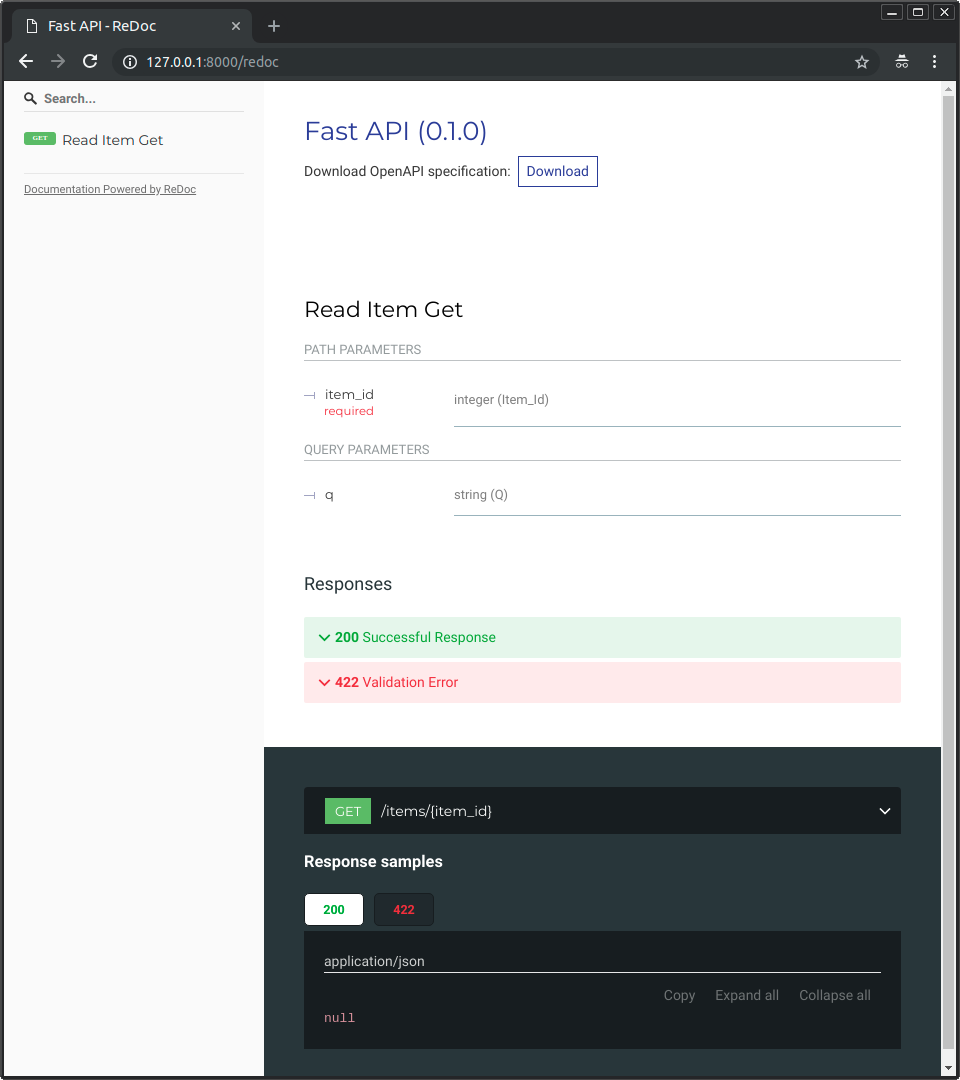- Sort Score
- Num 10 results
- Language All
Results 231 - 240 of 360 for declarou (0.05 seconds)
-
fastapi/exceptions.py
class FastAPIError(RuntimeError): """ A generic, FastAPI-specific error. """ class DependencyScopeError(FastAPIError): """ A dependency declared that it depends on another dependency with an invalid (narrower) scope. """ class ValidationException(Exception): def __init__( self, errors: Sequence[Any], *,
Created: Sun Dec 28 07:19:09 GMT 2025 - Last Modified: Sat Dec 27 12:54:56 GMT 2025 - 6.8K bytes - Click Count (0) -
docs/de/docs/tutorial/header-params.md
## `Header` importieren { #import-header } Importieren Sie zuerst `Header`: {* ../../docs_src/header_params/tutorial001_an_py310.py hl[3] *} ## `Header`-Parameter deklarieren { #declare-header-parameters } Deklarieren Sie dann die Header-Parameter mit derselben Struktur wie bei `Path`, `Query` und `Cookie`. Sie können den Defaultwert sowie alle zusätzlichen Validierungs- oder Annotationsparameter definieren:Created: Sun Dec 28 07:19:09 GMT 2025 - Last Modified: Sat Sep 20 15:10:09 GMT 2025 - 3.5K bytes - Click Count (0) -
docs/pt/docs/advanced/dataclasses.md
# Usando Dataclasses { #using-dataclasses } FastAPI é construído em cima do **Pydantic**, e eu tenho mostrado como usar modelos Pydantic para declarar requisições e respostas. Mas o FastAPI também suporta o uso de <a href="https://docs.python.org/3/library/dataclasses.html" class="external-link" target="_blank">`dataclasses`</a> da mesma forma: {* ../../docs_src/dataclasses_/tutorial001_py310.py hl[1,6:11,18:19] *}Created: Sun Dec 28 07:19:09 GMT 2025 - Last Modified: Fri Dec 26 10:43:02 GMT 2025 - 4.5K bytes - Click Count (0) -
docs/es/docs/advanced/dataclasses.md
# Usando Dataclasses { #using-dataclasses } FastAPI está construido sobre **Pydantic**, y te he estado mostrando cómo usar modelos de Pydantic para declarar requests y responses. Pero FastAPI también soporta el uso de <a href="https://docs.python.org/3/library/dataclasses.html" class="external-link" target="_blank">`dataclasses`</a> de la misma manera: {* ../../docs_src/dataclasses_/tutorial001_py310.py hl[1,6:11,18:19] *}Created: Sun Dec 28 07:19:09 GMT 2025 - Last Modified: Fri Dec 26 10:43:02 GMT 2025 - 4.5K bytes - Click Count (0) -
docs/pt/docs/index.md
 ## Evoluindo o Exemplo { #example-upgrade } Agora modifique o arquivo `main.py` para receber um corpo para uma requisição `PUT`. Declare o corpo utilizando tipos padrão Python, graças ao Pydantic. ```Python hl_lines="4 9-12 25-27" from typing import Union from fastapi import FastAPI from pydantic import BaseModel app = FastAPI()Created: Sun Dec 28 07:19:09 GMT 2025 - Last Modified: Tue Dec 16 20:32:40 GMT 2025 - 24.5K bytes - Click Count (0) -
docs/es/docs/tutorial/background-tasks.md
## Inyección de Dependencias { #dependency-injection } Usar `BackgroundTasks` también funciona con el sistema de inyección de dependencias, puedes declarar un parámetro de tipo `BackgroundTasks` en varios niveles: en una *path operation function*, en una dependencia (dependable), en una sub-dependencia, etc.Created: Sun Dec 28 07:19:09 GMT 2025 - Last Modified: Wed Dec 17 20:41:43 GMT 2025 - 5.1K bytes - Click Count (0) -
guava-testlib/src/com/google/common/collect/testing/google/SetMultimapAsMapTester.java
} @CollectionSize.Require(SEVERAL) @MapFeature.Require(SUPPORTS_REMOVE) /* * SetMultimap.asMap essentially returns a Map<K, Set<V>>; we just can't declare it that way. * Thus, calls like asMap().values().remove(someSet) are safe because they are comparing a set to * a collection of other sets. */ @SuppressWarnings("CollectionUndefinedEquality")
Created: Fri Dec 26 12:43:10 GMT 2025 - Last Modified: Tue May 13 17:27:14 GMT 2025 - 4.3K bytes - Click Count (0) -
build-logic-commons/build-platform/build.gradle.kts
plugins { `java-platform` } group = "gradlebuild" description = "Provides a platform that constrains versions of external dependencies used by Gradle" // Here you should declare versions which should be shared by the different modules of buildSrc itself val javaParserVersion = "3.18.0"Created: Wed Dec 31 11:36:14 GMT 2025 - Last Modified: Tue Dec 30 10:16:30 GMT 2025 - 4.6K bytes - Click Count (0) -
android/guava-testlib/src/com/google/common/collect/testing/features/FeatureUtil.java
incorporateRequirements(requirements, moreRequirements, testerAnnotation); } return requirements; } /** * Find all the tester annotations declared on a tester class or method. * * @param classOrMethod a class or method whose tester annotations to find * @return an iterable sequence of tester annotations on the class */
Created: Fri Dec 26 12:43:10 GMT 2025 - Last Modified: Sat Dec 21 14:50:24 GMT 2024 - 12.4K bytes - Click Count (0) -
docs/en/docs/async.md
<abbr title="too long; didn't read"><strong>TL;DR:</strong></abbr> If you are using third party libraries that tell you to call them with `await`, like: ```Python results = await some_library() ``` Then, declare your *path operation functions* with `async def` like: ```Python hl_lines="2" @app.get('/') async def read_results(): results = await some_library() return results ``` /// note
Created: Sun Dec 28 07:19:09 GMT 2025 - Last Modified: Sun Aug 31 09:56:21 GMT 2025 - 24K bytes - Click Count (0)